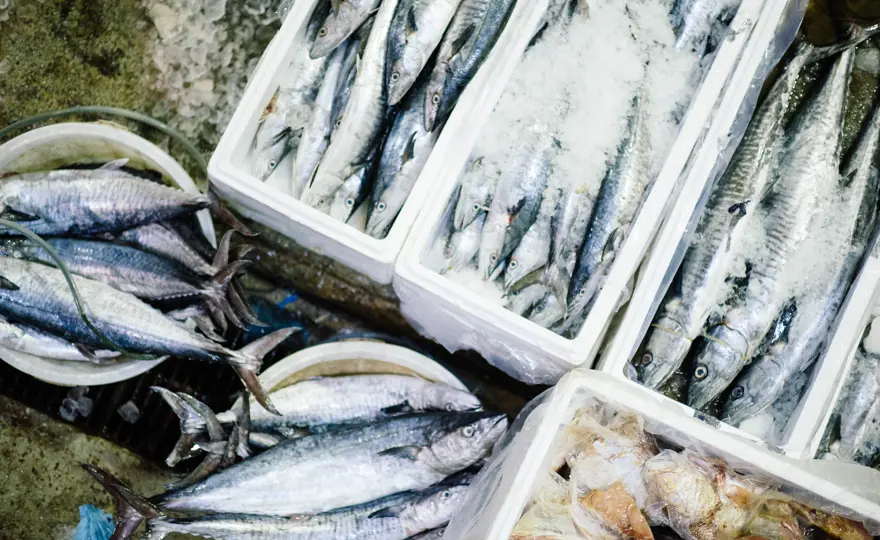ClientEarth Communications
3rd June 2021


It’s becoming increasingly obvious that we can’t turn a blind eye to the plight of our oceans. The trouble is, while we’ve been becoming more aware of the issues surrounding meat consumption, our knowledge of fish may be somewhat patchier.
Which kinds of fish are in trouble? Is farmed fish bad? Can we limit the negative impacts of commercial fishing with our buying choices?
We sat down with Oliver Tanqueray, coordinator of the Sustainable Seafood Coalition at ClientEarth, to fill in some of those gaps.
"If the seafood that is being sold hasn't been responsibly sourced, it can have a number of damaging impacts both on the environment and also on the people in the supply chain. One significant concern is overfishing. We know that more than a third of global fisheries are overfished, and this figure has been gradually adding up since the 1980s. The problem gets worse if we know that damaging fishing gear is being used. These are more likely to kill non-target species like dolphins, turtles or sharks if they are accidentally caught. And gear can also destroy precious habitats if it is dragged along the seabed.
Farmed seafood can also have its negative impacts, if the farms are not responsibly managed – you might have farmed fish escaping into the environment and these can compete with the vulnerable wild populations. Also, if those farms are sited in ecologically sensitive areas, the runoff from these farms of things like effluents, excess feed, or maybe antibiotics can have quite serious consequences.
Finally the ingredients that go into fish feed can have a range of impacts. If these are irresponsibly sourced, they can lead to all sorts of problems both on land and in the ocean.
All that being said, it is important to remember that all food has some impact, and that even within types of seafood, these impacts can vary hugely between species, fisheries, and different types of farms, depending on how they are managed.
Some seafood sources can be low-impact, they can be well managed and therefore be responsible choices. And it is because of this complexity that ClientEarth advocates for businesses to work hard to move towards a scenario where customers are only being offered responsible choices."
"Some businesses are really engaged in trying to ensure sure that they only sell responsibly sourced fish and seafood. ClientEarth helped to set up the Sustainable Seafood Coalition in 2011, an organisation of businesses that have all committed to a vision that all fish and seafood sold in the UK should come from sustainable sources. We've worked together over the years to define what responsible sourcing means and this involves a wide range of tools available to businesses. So any responsible business should be risk assessing all of their products and in that process it should identify where any improvements are needed. Importantly, when they engage in these improvements, they should be transparent to the public, NGOs and governments about how they are engaging in these improvements and transparent about any progress that's being made.
These improvements might involve using things like ratings and certification tools. They can also set up fisheries and aquaculture improvement projects in collaboration with other organisations. Increasingly, we are seeing businesses engaging in advocacy where they can try to improve the policies and the legislation that relates to fisheries and aquaculture management, trade and marine protection. Ultimately, businesses that are looking to make sure the fish they sell is sustainable should engage with pre-competitive collaboration platforms like the SSC. Most problems in the seafood supply chain can't really be solved by individual businesses going there alone and that's why we really need everyone engaged pulling in the same direction, to drive systemic change."
Challenge your supermarket, challenge your favorite brands, your local chippie, the restaurants, your fishmonger, to know how they are making sure that the products they're selling to you are environmentally and socially responsible.Oliver Tanqueray, Coordinator, Sustainable Seafood Coalition

"It is really not that straightforward to understand which fish and seafood products have been responsibly sourced and which have been having a negative impact on the environment and the people involved in that production. That's why here at ClientEarth we work with businesses and encourage them to take on that responsibility for doing it themselves. Responsible businesses shouldn't be offering their customers a single irresponsibly sourced product. When we achieve this systemic change, it should be far easier for you as a consumer to make ethical purchasing decisions.
That's why the most helpful thing that you as a consumer can do is ask questions. Where has it been caught, and what fishing gear are they using to catch it? Make it clear that you care where your seafood comes from and that you expect that the person selling it to you will be able to meet your concerns. This way they should want to respond and make progress in order to keep your custom.
Understandably, many shoppers can't wait for this systemic change to take place and they need simple guidance on the best seafood item that is on offer to them right now. There are some tools available for consumers to help with this. You can look for credible ecolabels which will appear on packaging: third-party ecolabels verify that the product has been independently certified and is environmentally sustainable. And you can also learn for what to look at for when buying fish by using the Marine Conservation Society’s 'Good Guide'. They have a website and an app that dives into different species, where they come from and what environmental impacts they have."